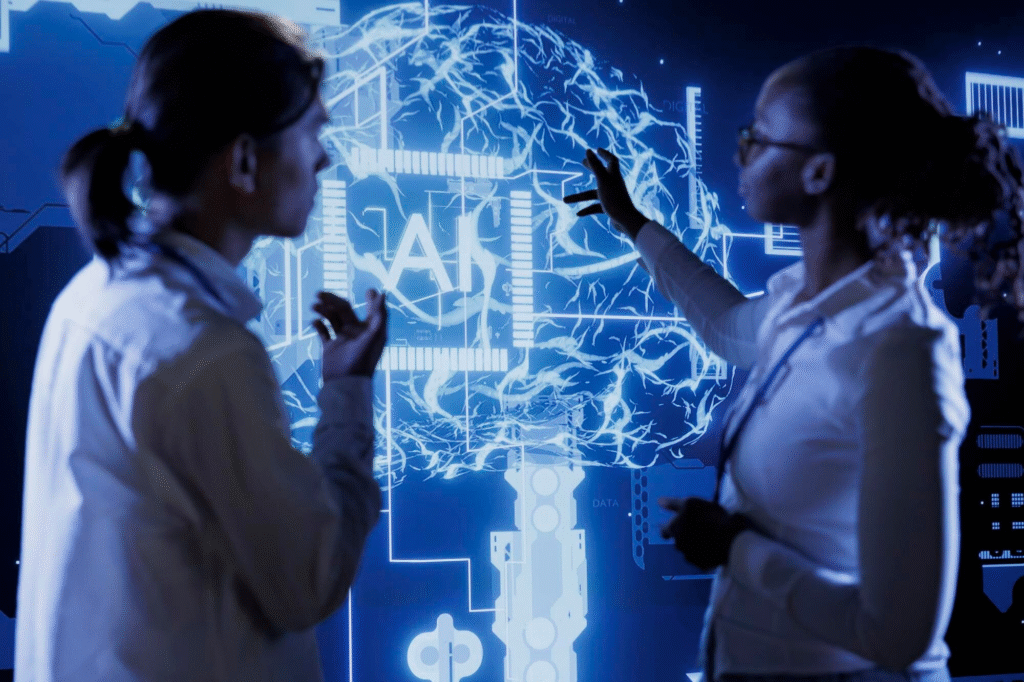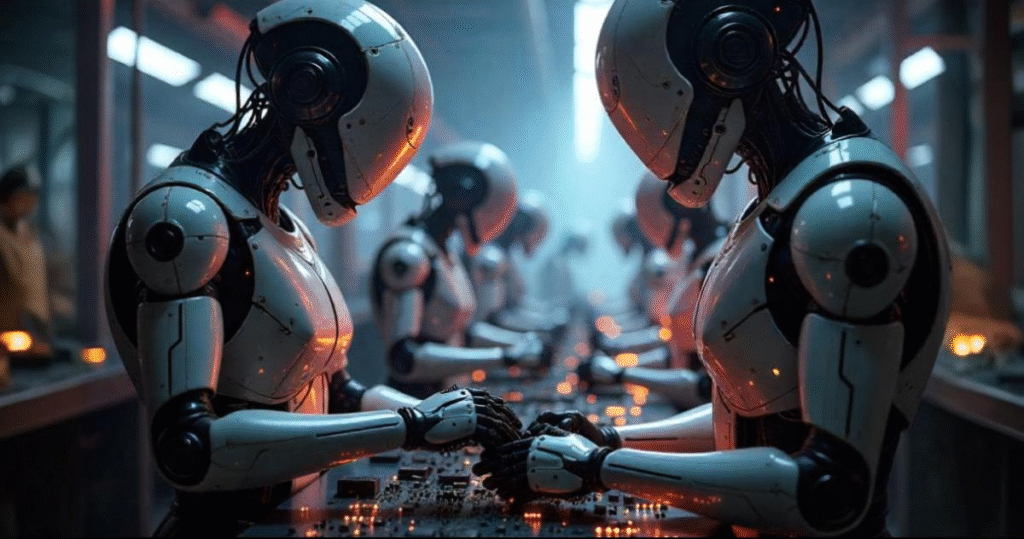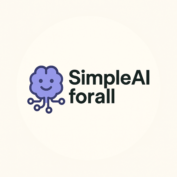Artificial Intelligence (AI) is no longer science fiction—it’s reshaping our world today. From self-driving cars to AI in healthcare, finance, and education, It is transforming industries and creating both opportunities and challenges for the future. However, as we embrace these advancements, we must address challenges, particularly job displacement, ethical implications, and economic equity.
The AI Shift: Automation, Careers, and Fairness

Ai is revolutionizing the workforce at a fast rate. It is automating routine tasks in manufacturing and retail while redefining our approach to healthcare and education, fundamentally reshaping entire industries. Take the automotive sector, for example; AI-powered robots now assemble cars with unmatched speed and accuracy, significantly enhancing production line efficiency. While these technological advancements are remarkable, they also pose important challenges, especially around employment. Positions such as cashiers, assembly line workers, and data entry clerks are increasingly being replaced by machines. In regions where these jobs are vital to the local economy, this shift can lead to unemployment and social instability. However, this transition presents not just challenges, but also exciting opportunities. Although some roles will vanish, new ones are emerging—especially in fields like data science, machine learning engineering, and AI ethics—professions that barely existed a decade ago. These roles demand a blend of technical skills and creative thinking, opening doors for those ready to adapt. For instance, healthcare professionals are harnessing smart technology to diagnose diseases more swiftly and accurately. With AI systems capable of analyzing medical images in a fraction of the time it takes a human, doctors can dedicate more time to complex patient cases. Thus, even as some tasks become automated, the need for skilled healthcare workers remains critical for making vital decisions and providing compassionate care that machines cannot replicate.
AI is also transforming education by enabling personalized learning experiences that empower students to learn at their own pace. Rather than replacing teachers, AI enhances their capacity to connect with and support students. Educators can leverage AI to track individual progress and tailor their teaching strategies, all while maintaining the human touch that makes learning truly impactful. That said, the rise of AI brings forth essential questions regarding fairness and equality. As automation revolutionizes industries, it creates a divide between those who have access to specialized training and education and those who do not. Individuals in lower-skilled positions may find it challenging to transition into the new workforce, exacerbating the divide between those who reap the benefits of machine learning tools and those who do not. To ensure everyone has a fair shot, governments, businesses, and educational institutions must collaborate on effective solutions. This could involve implementing reskilling programs to equip workers with the necessary skills, establishing social safety nets for those who lose their jobs, or creating policies that ensure the advantages of AI are shared more evenly across society. For instance, companies like Amazon and Google are already taking the lead by investing in training initiatives that help their employees transition into new roles.
These programs empower workers to learn vital skills such as coding and data analysis, preparing them for the jobs of the future. However, this responsibility should not fall solely on companies; governments must also take action to guarantee that these programs are accessible to everyone, irrespective of their background. Intelligent systems are not merely a force reshaping our world; it is a powerful tool that we can shape to our advantage. By prioritizing education, ensuring fairness, and fostering collaboration, we can create a future where AI benefits everyone—not just a select few. The pathway forward lies in embracing these changes and ensuring that individuals are prepared to thrive in an AI-driven world. If we approach this challenge with confidence and determination, AI can be a catalyst for growth that elevates us all, creating new opportunities and enhancing lives across the globe.
The future of ai: Ensuring Fairness, Accountability, and Lifelong Learning
As AI becomes more integrated into critical areas such as hiring, criminal justice, and agriculture, it is essential to ensure that these systems are fair, transparent, and accountable. AI algorithms are only as unbiased as the data they learn from; if that data is flawed, it can lead to biased outcomes that perpetuate inequality. For instance, in 2018, Amazon discontinued an AI hiring tool because it favored male candidates for technical roles. This tool was trained on resumes submitted to Amazon over 10 years ago, which came from men, causing the AI to develop a bias for male candidates. This example highlights the necessity for careful testing and monitoring of AI systems to avoid unintended biases. Therefore, governments, businesses, and academic institutions must collaborate to develop ethical standards for AI. These standards should ensure that AI systems are transparent, accountable, and free from discrimination. Regular evaluations are essential, so AI does not unintentionally discriminate based on gender, race, or socioeconomic status.
Despite concerns that AI will replace human workers, the future of AI can be one of collaboration rather than competition between humans and machines. AI provides an opportunity for us to work together, each leveraging our strengths. AI can handle repetitive, data-heavy tasks, allowing us to concentrate on more creative, strategic, and emotionally intelligent aspects of work. In agriculture, AI is playing a transformative role in crop management and farming practices. AI-powered systems, like precision farming tools, are helping farmers optimize crop yields while minimizing environmental impact. For instance, AI-driven drones are used to fly over fields, analyzing crop health, identifying signs of disease, and detecting areas where water or nutrients may be lacking. These drones utilize machine learning algorithms to analyze the images they capture, generating detailed reports that help farmers take targeted action. Instead of applying fertilizers or pesticides to an entire field, they can focus on the areas that truly need attention, reducing waste and environmental harm. Despite these technological advancements, human expertise remains critical in agriculture. Farmers bring local knowledge and experience that AI cannot replicate, especially when it comes to understanding weather patterns, market demands, and ensuring that AI systems are functioning correctly. While AI enhances farming practices, it is the collaboration between AI and human insight that ensures sustainable and efficient food production.

In the arts, AI is emerging as a creative partner rather than a competitor. Tools like OpenAI’s MuseNet and Google’s Magenta project help musicians compose original music by analyzing patterns across various genres and styles. These tools can generate entire symphonies or assist artists in exploring new creative directions, but the human touch remains crucial in bringing those pieces to life. For instance, Taryn Southern, who collaborated with AI to produce her album “I AM AI,” blends technology with human creativity to create music that reflects both innovation and artistic vision.
In customer service, AI chatbots used by companies like H&M and IKEA can handle basic inquiries such as checking stock levels or processing orders. Yet, when customers encounter more complex issues, human agents are still needed to provide empathy, problem-solving, and critical thinking. By allowing AI to manage routine tasks, customer service representatives can focus on delivering a more personalized and human experience.
As AI continues to evolve, lifelong learning will be vital for staying relevant in the workforce. Technology is advancing so rapidly that jobs that once required minimal technical expertise now demand skills in coding, data analysis, and AI applications. For example, marketing roles are increasingly expected to require knowledge of AI tools for data analysis and customer insights. However, it’s not just about technical skills; human abilities like emotional intelligence, creativity, and critical thinking are becoming even more essential. Consider the role of a teacher: while AI can personalize learning and assist students with basic skills, it cannot replace the empathy and understanding that a human teacher brings to the classroom. Educators are using AI to tailor lesson plans and identify students’ learning needs, but they still play an essential role in inspiring, guiding, and understanding their students.
Conclusion: Embracing Change for a Brighter Future
The rise of artificial intelligence is one of the most significant developments of our time. It promises to transform our world in ways we’re only beginning to understand, creating both exciting opportunities and complex challenges. As we navigate this transformative era, we must embrace change while being mindful of the ethical, economic, and social implications of AI. With humans and AI teaming up, the future of AI can lead us to a world that’s smarter, fairer, and actually kind of awesome. All it takes is accessible education, ethical choices, and a bit of collaboration magic. The future of AI is ours to shape — and together, we can make it outstanding, building a world where AI lifts up everyone, not just the tech wizards and robot whisperers.
AI’s potential is limitless, but its impact will ultimately depend on how we shape its development. The future of work, innovation, and human-machine collaboration is in our hands. There are ethical considerations to be taken serious so that everything can flow well.
